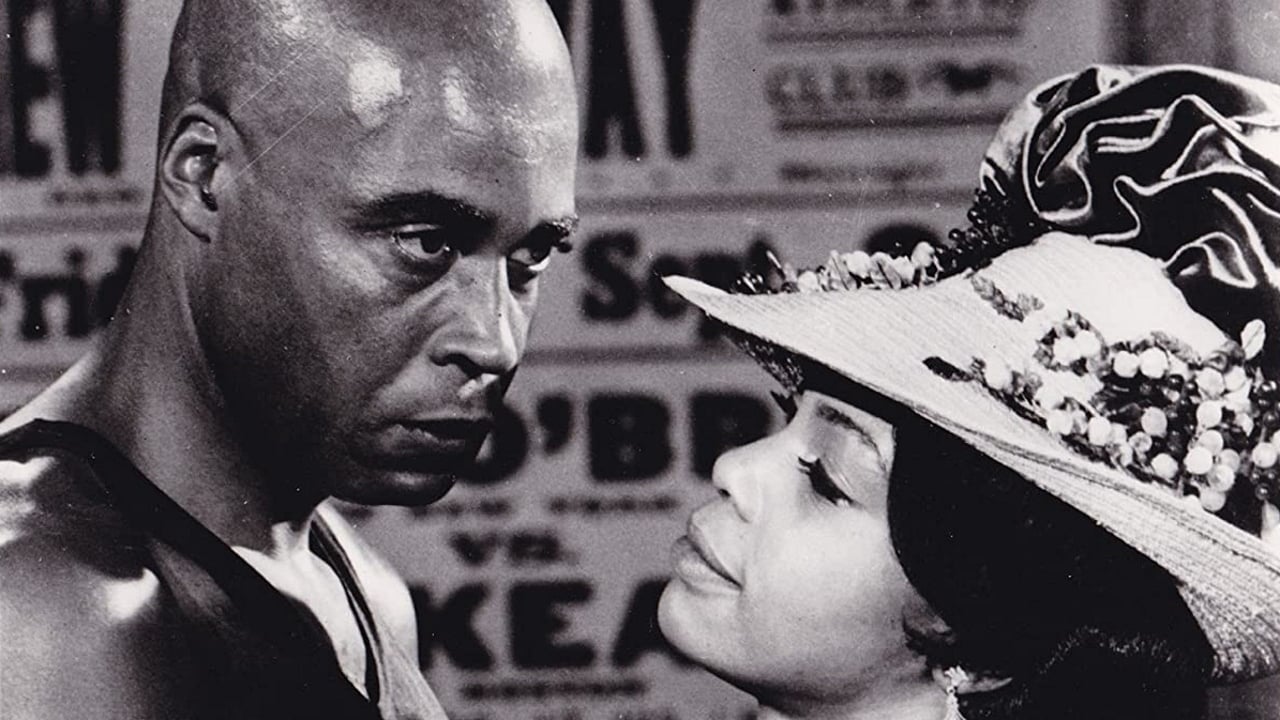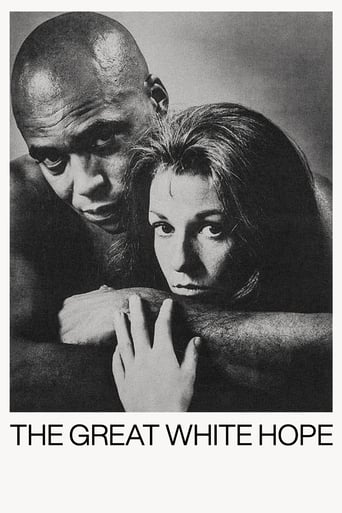Brendon Jones
It’s fine. It's literally the definition of a fine movie. You’ve seen it before, you know every beat and outcome before the characters even do. Only question is how much escapism you’re looking for.
Sienna-Rose Mclaughlin
The movie really just wants to entertain people.
Phillida
Let me be very fair here, this is not the best movie in my opinion. But, this movie is fun, it has purpose and is very enjoyable to watch.
Kayden
This is a dark and sometimes deeply uncomfortable drama
classicsoncall
I'm reminded of the tag line to the 1962 Western film "The Man Who Shot Liberty Valance" - "When the legend becomes fact, print the legend"."The Great White Hope" is a thinly veiled portrayal of the first black world heavyweight boxing champion Jack Johnson, who reigned from 1908 to 1915. The 'real' story put to celluloid would have been even more compelling than what was presented here, and I have to wonder why virtually every boxing story about real fighters put to film follows this pattern of poetic license. It was true as far back as 1942's "Gentleman Jim" (about champion Jim Corbett) right up to the modern era's "The Hurricane" (Rubin Carter). An exception might be the 1956 film "Somebody Up There Likes Me"; former champ Rocky Graziano gave the picture thumbs up regarding his life story.Apart from the historical aspects though, and treating the picture as a fictional story, the movie is actually quite compelling and provocative. I must say, I never considered James Earl Jones as the athletic type, but he's really sensational as Jack Jefferson. His physique supports the idea that he's a formidable boxer, though not in the same way as Stallone's Rocky who was cut to the crisp in "Rocky III". As Jack's girlfriend Eleanor, Jane Alexander delivers a stunning performance culminating in that Mexican breakup scene that's heart rending in emotional impact. That has to be one of the most intense personal scenes ever put to film, the result of which ends in tragedy that's almost unbearable.Even though this is a largely fictional film portrayal, I was still left somewhat frustrated by the lack of historical perspective as to when events were taking place. Reference was made at one point to the onset of World War I, but even then it was referred to as 'the war' which might offer some doubt to the casual viewer. For those interested in the picture's real life counterparts, former champ Brady (Larry Pennell) coming out of retirement represented James J. Jeffries (it didn't happen that way); Cap'n Dan (R.G. Armstrong) is a stand-in for former champ Gentleman Jim Corbett, and Jefferson's final rival in the ring, simply called The Kid, would have been Jess Willard, who actually did take the title away from Jack Johnson in Havana on April 5th, 1915. That fight went twenty six rounds and ended in controversy for many years, furthered by Johnson's signed statement that he threw the match in exchange for fifty thousand dollars (which he never got) and a government promise not to hassle him any more. In reality, the 'Galveston Giant' as he was known, simply ran out of gas and fell to a thunderous right to the jaw.
wandereramor
The main attraction of The Great White Hope is James Earl Jones at his peak. His performance as a thinly-disguised Jack Johnson is immediately magnetic, with Jones managing to express all the contradictions of the man himself, coming across as charming and threatening, righteous and vain, all at the same time.The rest of the film isn't half-bad either. It has the telltale signs of a theatrical adaptation, being heavy on the dialogue and light on the action, so those looking for a sports movie will be disappointed. But there's an undeniable pathos to the script and its story of pride and personal morals being worn down by social cynicism. It remains ambiguous what we should think of Johnson and his refusal to compromise with a racist society even as it hurts him and the ones he loves. He's clearly in the right, but -- and so few movies recognize this -- being right only takes you so far. It's a bit dated, but The Great White Hope still raises powerful questions that we're working through today, with an all-time great performance at its core.
MBunge
The Great White Hope demonstrates why a great play doesn't always become a great motion picture.Based on the real Jack Johnson, the first black man to win boxing's world heavyweight championship, The Great White Hope is the story of Jack Jefferson (James Earl Jones), the first black man to win boxing's world heavyweight championship. I'm not entirely sure why they fictionalized a true story. Maybe it was out of respect for Johnson's real life or maybe Howard Sackler, who wrote the play and adapted it for the big screen, just didn't want people complaining about any dramatic license that he took.Anyway, Jack Jefferson fights his way to the top of the boxing world and then wins the title when the man who retired as champion returns to the ring to defend the white race against the black interloper. For a while, Jack's on top of the world. He's got the title belt, money and his white fiancée Eleanor (Jane Alexander). His only worries are his common law wife Clara, the authorities trying to find something to arrest him on, and the chance that someone might just try and kill him, either for being a black champion or bedding a white woman. The feds eventually do nail Jack on a charge of taking a woman across state lines for the purpose of having sex with her, a law meant for pimps and prostitutes but turned against Jack and Eleanor.Jack and Eleanor flee the country and he tries to make a living as a fighter in Europe. That doesn't work out. Both because some countries don't want anything to do with him and because Jack isn't content to just fight a series of bums and collect a paycheck. Jack has to be the best in the world and everyone has to acknowledge it. Unable to fight, his money run out, Jack ends up driving away everyone he cares about until the feds finally corner him in Mexico and a terrible tragedy forces Jack to take a deal. He'll throw a fight and lose the title to a white fighter and they'll drop the charges against him. But during the match in Cuba, Jack just can't go through with it. He lets the white boxer beat on him for 10 rounds but won't go down. Then his pride rears up and Jack tries to win, but he's been hurt too bad and goes down for the count.The only real problem with The Great White Hope is that a lot of the story I just told you never ends up on the screen. Except for the final scene in an open air stadium where an ocean of white men in ties and hats cheer in bloodlust to see the black champion beaten, everything in this film could fit neatly on a theater stage. But the motion picture frees a story from the limitations of the stage. You can change scenes, move actors around and do all number of things impossible in live theater. On stage, you usually have to hear a lot of the story. In a movie, you can see all of the story. With The Great White Hope, it's a movie where you hear most of it. Jack Johnson's life is a great tale but when you compare this with other boxing movies like Rocky or Raging Bull, you can see how clinging to the form and function of the play forces Sackler and director Martin Ritt to leave out things they don't need to leave out.While the plot is somewhat cramped, the sterling performances more than make up for it. Hal Holbrook shines in a small role as an overly clever district attorney who doesn't want to bring Jack Jefferson down but feels he must. Jane Alexander is also quite fine as a woman truly and deeply in love with her man but still not entirely free from what it means to be a white woman loving a black man in the dawning of the 20th century.First and last, though, The Great White Hope is James Earl Jones' movie and he dominates it from beginning to end. His Jack Jefferson is a towering figure of joy and unrelenting strength. He shows us the heart of a man who genuinely loves life and revels in it. Then he shows us inside that heart an angry insistence that he go through life on his terms and no one else's. Not the white promoters, not the black people who cheer for him, not even the terms of the woman he loves. Jack's constant smile is both an expression of his deep happiness and a baring of his teeth at everyone and every thing in the world.The Great White Hope also does a decent job for a piece of entertainment at giving people a deeper look into American racism. This film is about how racism is not just hate, though epithets like the N-word get thrown around a lot, but is also about an idea that the world is white people up high, black people down low and how both whites and blacks internalize that idea until they don't even realize how it shapes their thoughts and emotions.This film has most of the problems of plays that turn into movies, but it also has the major advantage of such work. Plays can overcome a lot of problems if they give an actor the sort of material with which he can stand up and thunder. James Earl Jones thunders in The Great White Hope and you'll enjoy watching him storm.
edwagreen
James Earl Jones's acting was superb and he certainly deserved his Oscar nomination for best actor. Jane Alexander provided a moody portrait of the white Australian woman who loved him deeply but could not cope with him with eventual tragedy occurring for her. Her Oscar nomination for best actress should have been in the supporting category.Other than Jones, the other characters here aren't able to develop. Rather, we have a film here when everything happens too quickly.Beah Richards, as his beloved mother Tiny, is effective but she only appears in one scene in the film. Ditto with the black woman who portrayed his common law wife.It appeared that racism was alive and functioning in England as well when Jones and Alexander went there for his fighting opportunity and to get away from the racist charges that plagued him.The dilemma confronting Jefferson (Jones) regarding whether to throw the fight so that he can get his sentence reduced is never fully worked on in this film which really has some weak writing.

